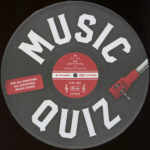Brazilian music has a unique and simple beauty. Here is how singer Anna Salleh’s profile starts at her site:
Singer/guitarist Anna Salleh (pronounced ‘Sah-lay’) has been fast developing a reputation as one of Sydney’s finest exponents of Brazilian jazz and other crossover music styles. From honey-smooth bossa and ballads, and irrepressible samba, to playful swing, cool jazz and enchanting choro, she includes surprise favourites all in the mix. Songs of beauty, sorrow, irreverence and joy.
about-anna-salleh-BrazilAnna cut her teeth performing in acappella groups, jazz bands and improvised theatre in Sydney, Kuala Lumpur and Edinburgh. But in 2010, she rediscovered the beauty of Brazilian music that first captured her imagination as a child. She spent three months in Rio de Janeiro performing with local musicians, and seeking out the wisdom of elders to deepen her understanding of Brazilian music. (Continue Reading…)
Wikipedia, if it has a fault, it is that it provides too much information. (Along the same lines, someone once said of the pitcher Tommy John, who apparently was a motormouth: “If you ask him what time it is, he’ll tell you how the watch was made.”) Usually, the first paragraph does the job. Here is the site’s take on Brazilian music, which goes beyond samba:
The music of Brazil encompasses various regional music styles influenced y African, European and Amerindian forms. After 500 years of history, Brazilian music developed some unique and original styles such as samba, bossa nova, MPB, RAP, sertanejo, Brazilian rock, pagode, tropicalia, choro, maracatu, frevo, forró, axé,brega, and others. Samba has become the best known form of Brazilian music worldwide, especially because of the country’s carnival, although bossa nova, which had Antônio Carlos Jobim as one of its most acclaimed composers and performers, have received much attention abroad since the 1950s, when the song “Desafinado“, interpreted by João Gilberto, was first released. Instrumental music is also largely practiced in Brazil, with styles ranging from classical to popular andjazz influenced forms, featuring composers like Heitor Villa-eLobos, Pixinguinha and Hermeto Pascoal. The country also has a growing community of modern/experimental composition, including electroacoustic music. (Continue Reading…)
Above is “Manhã de Carnaval,” which is from the fabulous 1959 movie Black Opheus. I found it by accident and think it’s great. Below is “O Homem Falou.”








Recent Comments